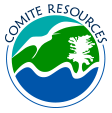
Comite Resources provides several additional services listed below. Comite Resources is staffed with PhD level scientists who understand statistical analysis and data management, as well as novel concepts and technologies such as carbon sequestration and water quality trading. We also have extensive experience working with wastewater treatment plant operators to optimize their current systems.
Carbon Sequestration
The monetization of carbon sequestration has great potential as an additional revenue source for landowners and municipalities. Comite Resources has partnered with Tierra Resources on a variety of carbon sequestration projects, starting with the development of a wetland carbon sequestration methodology for use in the Louisiana coastal zone. We measured the amount of carbon being sequestered by the St. Charles Parish assimilation wetland, which we wrote into a scientific publication available here. More information about our work with carbon sequestration can be found here.
Wastewater Treatment System Evaluation
Comite Resources scientists have been working with wastewater treatment facilities in Louisiana for over 10 years. We have the knowledge to evaluate treatment and to help facilities meet their LPDES permit limits. We also work with small companies and homeowners to evaluate package plants and septic systems to develop methods for reducing discharges of pollutants and fecal coliform.
Data Analysis & Management
Scientists with Comite Resources have extensive backgrounds in applied science and have carried out hundreds of laboratory and field experiments that have generated a plethora of data and scientific publications (see Publications). Data management, analysis and archival are central to our daily operations.
Water Quality Trading
The USEPA initiated the Water Quality Trading (WQT) program to develop an innovative, market-based, cost-effective mechanism to help communities achieve local water quality improvements and help dischargers meet their discharge permit limits. Dischargers within a watershed may have very different costs to reduce the same pollutant and this cost difference provides an incentive for trading to occur. Facilities with higher pollution costs may be able to meet their discharge requirements by purchasing equivalent pollutant reductions from another source at a lower cost than that of upgrading their facility to meet permit limits.
The Louisiana Department of Environmental Quality (LDEQ) is currently developing a WQT program to facilitate trading among watershed stakeholders to help reduce pollutants in Louisiana’s surface waters. While this program is still in development, Comite Resources scientists are attending stakeholder meetings to learn about and to contribute information to the program. Once initiated, Comite Resources will be able to determine eligibility of different entities and to design a profitable WQT project.


